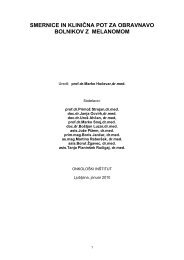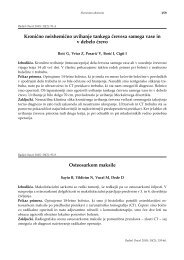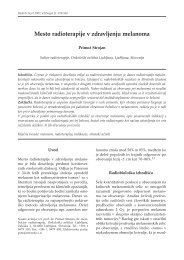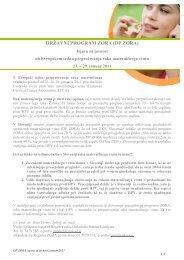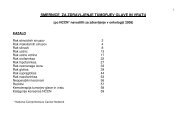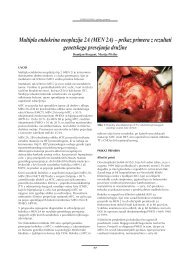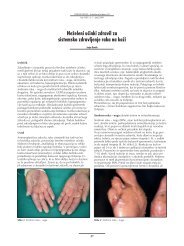You also want an ePaper? Increase the reach of your titles
YUMPU automatically turns print PDFs into web optimized ePapers that Google loves.
The role <strong>of</strong> the immune proteasomes in the anticancer defence<br />
N. P. Sharova1 , T. M. Astakhova1, L. A. Zakharova1, Ya. D. Karpova1, I. I. Khegay2<br />
1N. K. Koltsov Institute <strong>of</strong> Developmental Biology, Russian Academy <strong>of</strong> Sciences, Moscow; 2Institute <strong>of</strong><br />
cytology and genetics, Sibirian Dept. <strong>of</strong> Russian Academy <strong>of</strong> Sciences, Novosibirsk<br />
The immune proteasomes play an important role in the mammalian and human T cell<br />
immunity. Producing the antigenic epitops from proteins, they participate in the negative<br />
selection <strong>of</strong> thymocytes in thymus and in the activation <strong>of</strong> naive T-CD8+ lymphocytes in<br />
the secondary lymphoid organs. In any tissue or organ except the brain, the immune proteasomes<br />
switch on the signal for the elimination <strong>of</strong> abnormal cells which express altered<br />
(mutant) or foreign (viral) genes. In such cells the immune proteasomes produce or start<br />
the production <strong>of</strong> antigenic epitops from mutant or viral proteins. An antigenic epitop<br />
binds molecules <strong>of</strong> the major histocompatibility complex class I to be transported to the<br />
cell surface. This structure represents the signal for cytotoxic T lymphocytes to identify<br />
abnormal cells and induce their apoptosis. On the one hand, if the immune system is defective,<br />
numerous mutations in somatic cells can cause the malignant transformation. On<br />
the other hand, can changes in the immune proteasome pool in a cell be related to its<br />
malignant transformation? To answer this question, we investigated the peculiarities <strong>of</strong><br />
the immune proteasome pool in the developed ascite carcinoma Krebs-II on the 7 th day<br />
after transplanting to Balb/c mice. Besides, we investigated the changes in the immune<br />
proteasome pools in carcinosarcoma Walker 256 on the 7 th and 14 th days after transplanting<br />
to WAG and Brattleboro rats. The latter are the unique vasopressin deficient rats in<br />
which malignant tumor Walker 256 slowly grows up to the 15-18 th day, then decreases and<br />
disappears up to the 30 th day. In all experiments, we compared the changes in the immune<br />
proteasome pool with those <strong>of</strong> the total proteasome pool and 26S-proteasome pool by<br />
Western blotting.<br />
We showed that the level <strong>of</strong> the immune proteasomes in all developing tumors dra-matically<br />
falls. Besides, proteasome pool is deficient in the immune subtypes in Walker 256 cells<br />
in Brattleboro rats on 7 th day, and on the contrary, the level <strong>of</strong> the immune proteasomes<br />
significantly increases in this tumor up to 14<br />
l46<br />
th day. These data confirm that the reason <strong>of</strong><br />
the successful development <strong>of</strong> a malignant tumor may be related to the partial or complete<br />
exclusion <strong>of</strong> the immune proteasomes from its cells. That allows these cells to avoid the<br />
immune surveillance. In contrast to the growing tumor, the in-crease <strong>of</strong> the immune proteasome<br />
level in the disappearing tumor may open its cells to the immune system and it<br />
can be the reason <strong>of</strong> the tumor regression. It is interesting that the decrease <strong>of</strong> the immune<br />
proteasome level in the growing tumors is accompanied by the increase <strong>of</strong> the 26S-proteasome<br />
pool and <strong>of</strong> the total proteasome pool levels, and on the contrary, the increase <strong>of</strong> the<br />
immune proteasome level in the regressing tumor is ac-companied by the decrease <strong>of</strong> the<br />
total proteasome pool level. Moreover, in the cells <strong>of</strong> regressing tumor in Brattleboro rats,<br />
26S-proteasomes disappear at all up to the 14 th day. It is clear that increased pool <strong>of</strong> 26S<br />
proteasomes is necessary for exact cell cycle regulation <strong>of</strong> actively proliferating tumor cells<br />
and its elimination can be the second reason <strong>of</strong> the tumor regression. Thus, the peculiarities<br />
<strong>of</strong> the proteasome expression in tumor cells define their future fate.<br />
Supported by the Russian Foundation for Basic Research (projects 05-04-48830 and 06-04-48229).<br />
62



